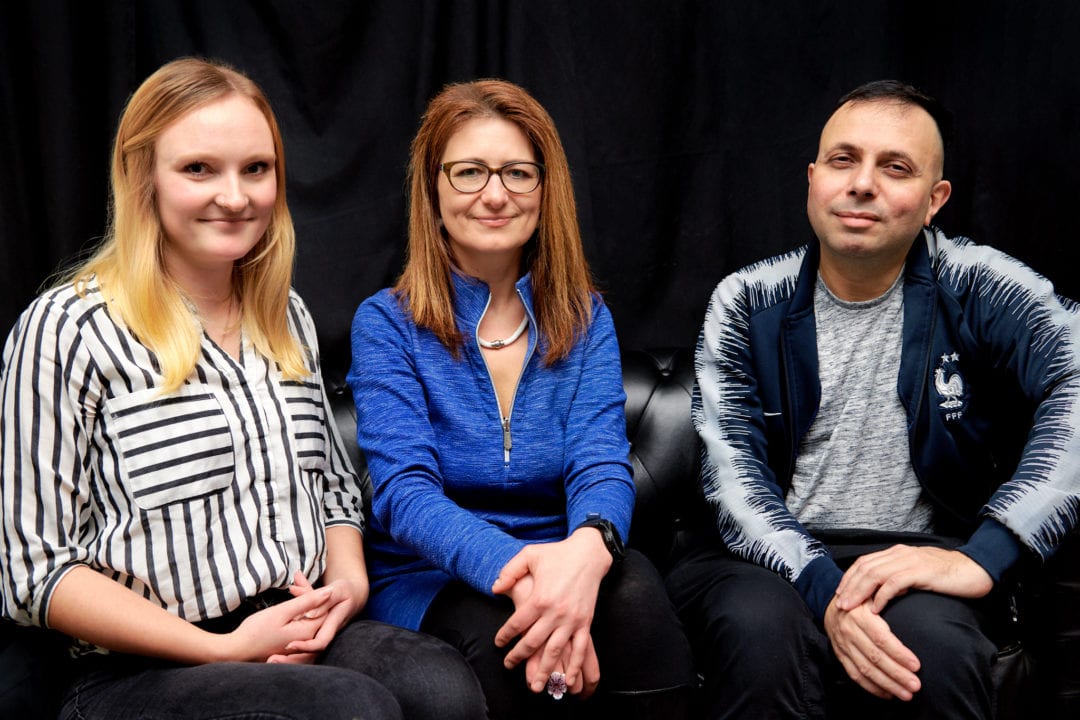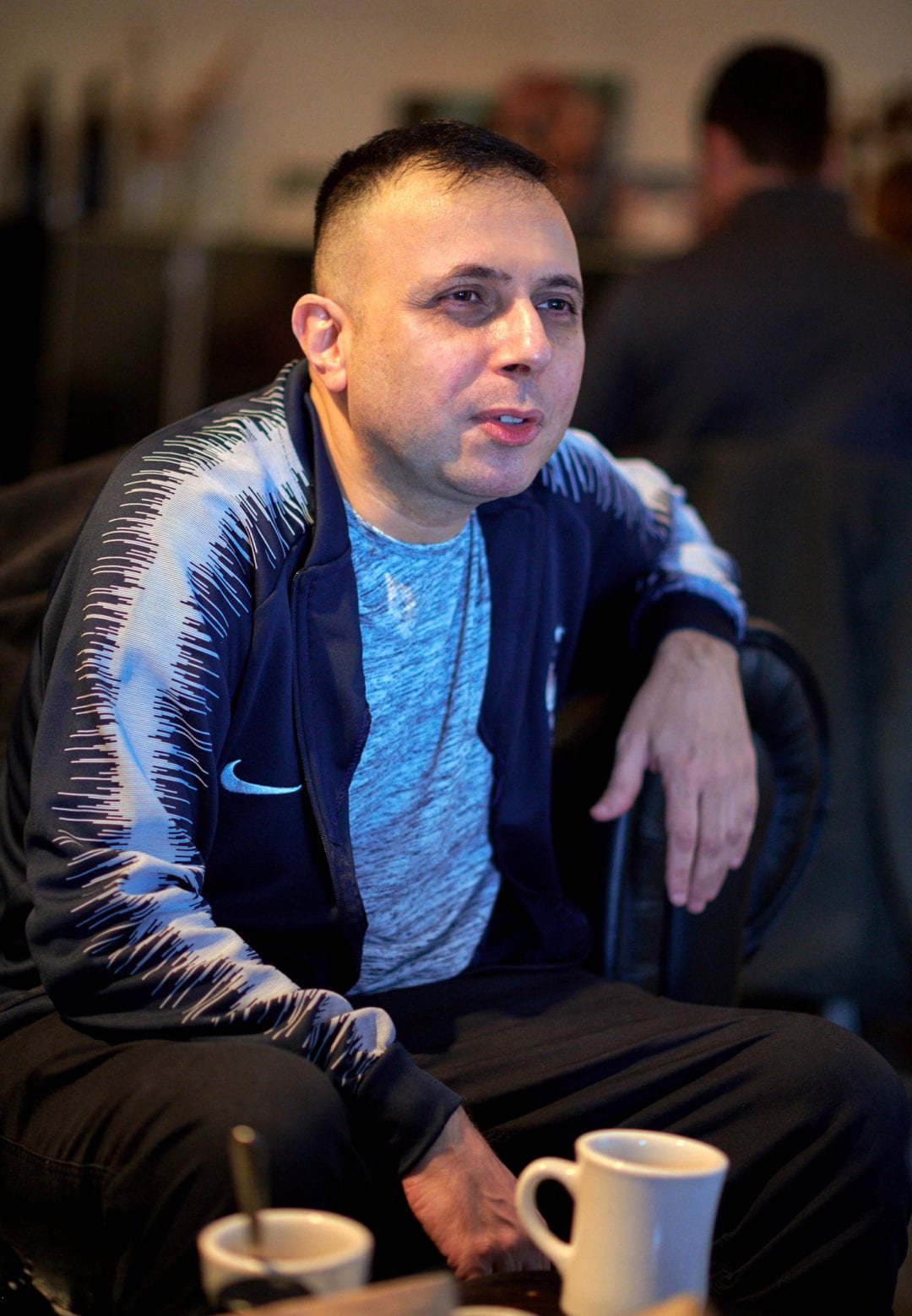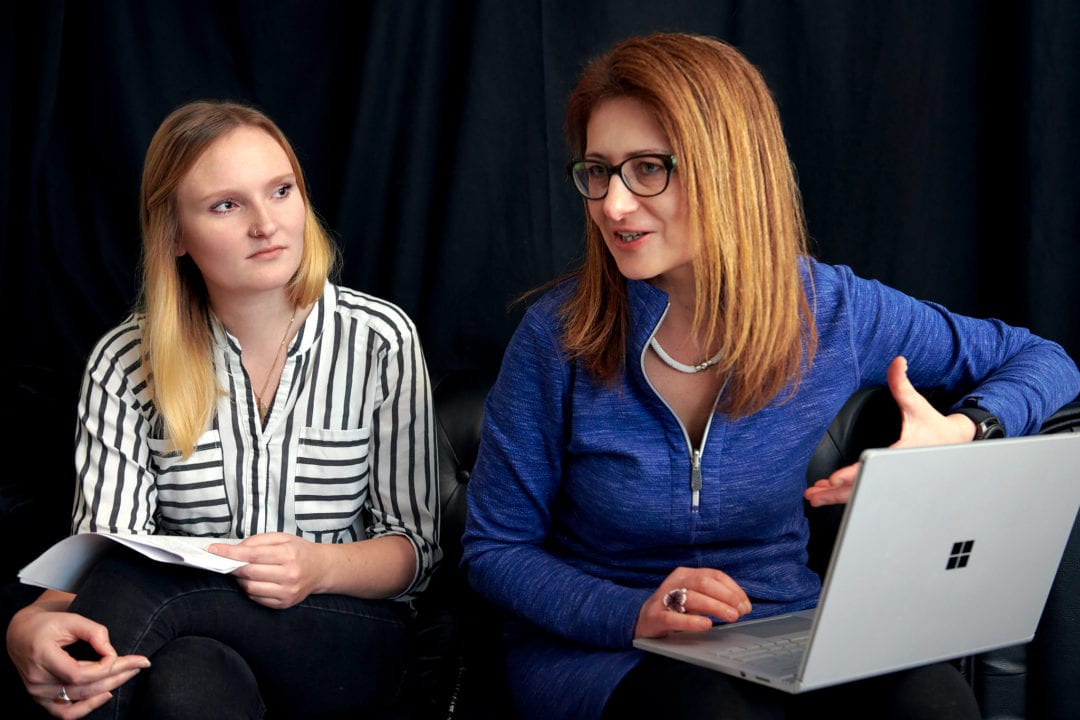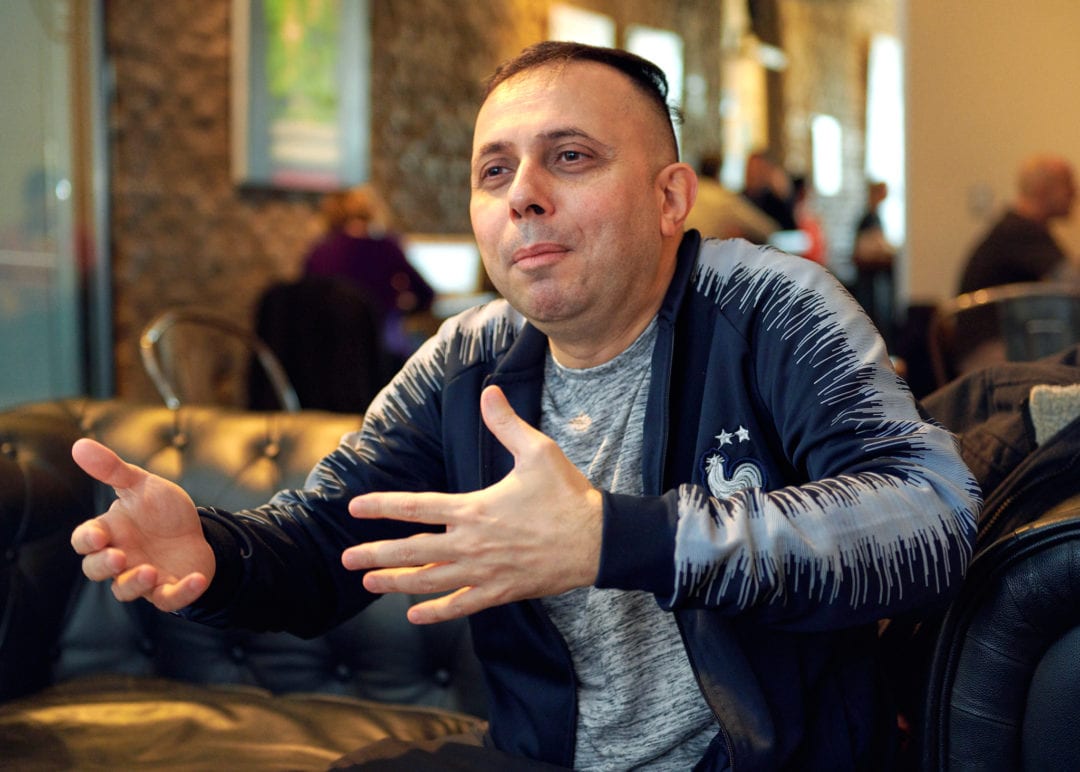Vancouver-based Arabic translator Jim-Ryan in an interview with LingoStar
About the translation industry and the challenges of Arabic translations
Arabic is the third most spoken language after English and French by the number of countries in which it is spoken, the fifth most spoken language by the number of native speakers, and sixth most spoken language by the total number of speakers, both native speakers and second-language speakers included. These numbers clearly indicate that the Arabic language is important worldwide. This led us to invite our Arabic translator Jim-Ryan to do an interview about the challenges of Arabic translations, the characteristics of the Arabic language, and the translation industry in general.

Lisa Menne (left), Lenka de Graafova (center), Jim-Ryan Farra (right) ©robertdemeterphotography.com
We met passionate Arabic translator Jim-Ryan, who has cooperated on translations with LingoStar since 2010, in a café in Vancouver. 2010 was also the year in which his translation career began. Born in Syria, his native language is Arabic. Having lived in France and French-speaking Canada for several years, he became fluent in French as well. However, with English as his second language he mainly translates from English into Arabic these days.
He told us that languages have always been a passion for him, although the translator job is not even his main career choice: Jim-Ryan is also an actor. So, we started by talking about his first job for LingoStar – a translation of a script. It turned out that he had also auditioned with a film company for parts of the script that he had translated. Jim-Ryan pointed out that it was challenging to experience both the actor’s approach and translator’s approach to the text. That’s because he could see how other, non-native Arabic actors, interpreted the Arabic text that he had translated, and he was not very satisfied with their interpretation. Thus came up the first important question:
Do you think translators can do a better job preparing actors for their roles when the actors are English speakers and have to speak a foreign language in their part?
It depends what kind of translator you have. Maybe because I have an acting background, I could help on that, but not every translator can do that. Also, coaching actors requires knowledge of what an actor is doing. For example, you have to be aware of how they prepare for their scene. However, when speaking a language there is always a certain melody and that is important if you want to sound authentic in that language.
What is your favorite language combination?
Actually I like all of them. However, now I’m mostly working from English into Arabic rather than from French into Arabic. Every language has its special moments that are fun. You always have to understand the culture to be able to translate into another language. Most of the time, you cannot translate something literally. One example is the simple question “How are you?” In French for example you say “Ça va?” which means “How does it go?” or formerly “How is the pee going?” and this expression goes back to King Louis XIV and the ability to pee as a sign of good health. In other languages you say “What is your color?” because face colors indicate a certain health status. When translating this, you have to find equivalents in the other language, because otherwise it does not make sense.
Can you give us examples of challenging or problematic expressions to translate into Arabic?
For example in Arabic we don’t use the English saying “Like father, like son”. In Arabic, if you want to point out any similarities in a family, you say something like “The son of lion is a lion”. Lions are the kings of the jungle, so if the father is a king, the son is a king, too.
Also, if you watch a movie, you will see that in the subtitles they don’t translate every word as it is said in the source language. For example, you can’t use the English “f-language” in Arabic translations. It is culturally not accepted, so as an Arabic translator you have to find a way to make it appropriate for the target audience, in order not to hurt them. In different languages, certain expressions are more or less shameful. In Arabic for example “You are a dog” is already very insulting, while it does not mean anything in English. So, the inverse conclusion is that English insults are considered too shameful for the Arabic world. It becomes particularly difficult when it’s something concerning God. Many cultures don’t accept it if you are talking about God in a rude way.
Another difficult thing is the right to left writing. We always try to check how the printed version of the document looks and how brochures fold. However, sometimes we don’t have the chance to do so as we only see the document in Word format. Occasionally, Arabic texts end up being displayed in the wrong way and words or phrases lose their meaning in the final design brochures. I’ve seen this a lot: at airports, in videos, in shops. That’s why in Arabic the formatting is very important. Thus, at LingoStar we check the final PDF proofs of design brochures.

Arabic Translator Jim-Ryan on the challenges of Arabic translations ©robertdemeterphotography.com
We once had an Arabic translator who rejected translating a text about women’s health issues because of the culture. How do you see this from the translator’s point of view?
I think we can always find a way to translate things without really hurting the readers. Because it is not a question, there is nothing that we cannot translate. You have to find a way to communicate with the other culture. Another problematic thing is, for example, the translation of different kinds of relationships in other cultures. Because in Arabic, there are no other relationships except for marriage. Still, you can simply say “partner” and the Arabic readers will understand: This is a person that you are with. We don’t need to know what kind of relationship it is, but it’s a relationship.
What other challenges have you experienced in the translation industry?
Sometimes you have to invent words. You might have terms in a document that don’t exist in Arabic yet, especially concerning science or technology, and nobody before you has ever translated this. Inventing a new word requires a lot of research though, because you need to know the client’s product very well.
Also, creativity is a very big part of this process. And then sometimes you have a disagreement with other translators, editors or the client concerning this invented word, because they want to use an existing one, but that existing word doesn’t apply here or doesn’t cover the whole meaning of what is said in the source language. In the end, it’s the client who decides, because it is their product. This means you also have to be flexible and cannot insist too much on what you came up with, because you might have to accept someone else’s suggestions.
At LingoStar we follow strict quality assurance procedures involving translation, editing and finalization of each translation. How do you like having your work edited? Do you find that useful or do you sometimes feel offended?
The first time I was edited was quite challenging and I had to adapt. But now I want somebody to edit my work, because sometimes you are so focused on what you are doing or you are so excited to deliver, that you make mistakes such as little typos. I think LingoStar is the only company that I have worked with that has editors and that takes the editing very seriously. I see now that it is very important to check your work multiple times, because sometimes it happens that I check it, then the editor checks it, I get it back for finalization and there might still be a tiny mistake.
The only thing that’s a little upsetting is when clients let non-professionals edit the translation. You put so much effort into the translation and in the end you have to justify it to a person, who is actually not experienced enough to judge it. Also, you chose your translation for a specific reason, but of course there are a hundred other ways to translate it. Most of the time you simply cannot say something is wrong – it’s just different.
Talking about clients, what do you think is important in the communication with them?
First of all, you need to listen to the customer. Even if we sometimes disagree with them, we have to respect their choices. In the end, the client uses the translation for their particular purposes. Our relation with the translation ends after we have delivered. However, the clients sometimes don’t know a lot about our job and you might have to teach clients in case their expectations or instructions are not appropriate. For example, we always have to keep in mind who the final user of the translation will be.
Speaking about the final user of the translation, what else can you tell us about localization which is adapting the translation culturally and linguistically for the target group?
For example, we did a translation for Arabic parents in Canada. Of course you can’t just do a translation as if they were Arabic people in an Arabic country. So for them you can use certain English terms in the translation, because you need to refer to the Canadian institutions or other typically Canadian things. For Arabic parents in the Arabic world you would have to translate very differently.
Having lived in France, I noticed something else when I arrived in Quebec: French language in Quebec is different from the French language in France. It is very interesting, the way that they take English expressions, translate them to French and use them in their daily life. In France for example, when you say to somebody “Thank you” the answer will be “For nothing” or “Please don’t thank me”. However, in Quebec they say “Merci, bienvenue.” which goes back to the English “You are welcome”. Also, when they call somebody, they start by saying “Bonjour” and they end by saying “Bonjour”. In France you will never say “Bonjour” at the end of your call, you will say “Au revoir”. If you said “Bonjour” at the end of a call in France, people might think “Oh, it’s starting again!”

Lenka (right) and Lisa (left) interviewing Arabic translator Jim-Ryan about changes in the Arabic language. ©robertdemeterphotography.com
So, judging from that, do you think the Arabic language, too, is changing and adapting to new developments in the world like technology and science? Do you think that language itself is changing due to migration as well?
I think the Arabic language is adapting to other languages. Nowadays, the world is more open, everybody is dealing with everybody. Arabic as any other language tries to take in foreign languages. You have many more English terms in Arabic. For example, products are not always produced in an Arabic country. Thus, they come with their original names and you usually keep those.
The Arabic language is changing, but we have an institution similar to the Académie Française in France in order to preserve the Arabic language. They define how to translate new words into Arabic like “internet”, “TV” or “studio”. They will translate it to a certain Arabic word, they will give it a new name but everybody will keep using its English term such as “internet” at the end.
I really regret that we are losing the Arabic language bit by bit. It’s a rich language but unfortunately today we are only using about 50 percent of it. In the future we might only be using 30 percent. Some countries are very good at preserving their language, like France, but I think one day, we will all speak the same language.
Do you think social media usage contributes to the language loss you are talking about?
I think that’s a big part of the problem, so yes. But it’s also because people don’t read much these days. Reading is very important, especially for translators. To be good at translating, you have to read. And that’s why I prefer the combination of English to Arabic over Arabic to English: I did a lot more reading in Arabic than in English. So I have a certain control or capacity to work in Arabic and find better words.
This is something I learned when I started learning languages: if you want to write well, you have to read, if you want to talk, you have to listen. So I think reading in the language that you would love to translate into is one of the tasks that every translator should work on. That’s why I continue to read in Arabic even though it’s been more than 20 years since I left Syria.
In addition, new generations invent their own language. For example, people didn’t use “What’s up” in the years of the Victorian era yet. But it is now and you have to listen to it and understand it. New things are good; the language of the new generation stands for a whole new culture. Still, I think this destroys the language in certain ways. I hope that there is a way that we can preserve the old language a little longer.
If you think we will all speak the same language one day, how do you think the job of translators will develop?
I think at some point it will disappear. We will probably become editors or writers with a focus on a certain field. But this will not happen right away. It will take us two to three hundred years to arrive at that point. I think in the near future, translators will still play a big role. They have played a big role in the past because it was the only way to know one another. Translators usually work to bring people together. However, they can also work against people and mistranslation can even lead to wars.
What do you personally like most about your job?
Every translation gives you new knowledge – you learn. If you are translating health sheets, you will learn more about health issues in both languages; if you translate technical documents you will gain more knowledge in that field. This applies for all industries.
Additionally, it’s a beautiful thing at the end of the translation, when you look at it after some hours and you realize “It was me, who did this.” It is fascinating to see what your own brain was able to produce. It’s like when you find something you made as a child and look at it after all those years and you think it’s awesome.
Yes, I can confirm that: It is interesting to see what even a child’s brain is capable of.
Absolutely, today’s children are even luckier than us back then. They have access to all these new technologies. When I was a child, we merely had two channels on the TV and no internet. So we can ask more from today’s children because of all the knowledge they have access to via the new media. The only sad part about it is that they don’t read as much anymore. Reading something online is not the same as having a book you can actually touch. But that obviously depends on the family and how much it exposes the child to books.
So you were talking a lot about the magic that translation creates for you. How do you think clients perceive our work? How do you think clients appreciate a translator’s job?
Some clients will be happy to see that their information is accessible in Arabic now. I think for them it’s a new opening. It makes the clients’ work easier and it makes the product more attractive for the Arabic market. Of course, there are always clients who don’t care. They only want to see the results as soon as possible and don’t see the complex process behind it. But mainly it’s the final user of the translation who will benefit from it and appreciate it, even if he does not know that a person, probably coming from their own country, did their best to adjust the text as best as possible to the target audience. They will feel appreciated and feel like they are taken more seriously.
Still, sometimes it can be hard when you don’t receive the help you need from the client to complete your job. It can happen that you have questions about the document you are supposed to translate and the client does not have enough time to deal with this. In those situations, if you really don’t get an answer, you can only improvise. However, you are risking delivering an inappropriate translation and the client might not realize that it’s because of the missing answers from his side.
Lastly, clients tend to criticize translators more than other professions. You hardly ever question a doctor’s or a graphic designer’s work because you simply don’t know a lot about it. But a lot of people speak more than one language and think they know better. Or, what’s even worse is that they simply believe what Google Translate tells them. If you turn to a professional agency or a professional translator, you should let them do their job, just as you do yours, and trust that they are the best at what they are doing.
Last but not least, can you tell us a little about advantages and disadvantages of being a freelance Arabic translator?
Sometimes it can be hard because the market has become more open these days. There are Arabic translators from the other side of the world offering translations for very low prices, so there is more competition now. But it’s not only about competing; you also have to see what’s reasonable. It’s not worth it, working for two cents per word. Maybe in Egypt that’s enough, but if you are living in Canada, the living cost is higher.
Also, you need to respect what you are doing and try to keep the price span up for the whole industry. Usually clients who ask for prices like that don’t appreciate your work. They are willing to spend more money on a sandwich than on a translation that will be very useful to their business. Most of the time, people underestimate a freelancer’s job because they think you have a comfortable job working at home but sometimes you work the whole night and no one gives you credit for it.
Conclusion
In this very interesting and detailed interview with Arabic translator Jim-Ryan, we found out about the cultural challenges of translating into Arabic, the adaption of the Arabic language to the modern world and the language loss tied to that, the magic of a completed translation, the importance of editing, the difficulties in the communication with clients, and more. LingoStar’s Arabic translator Jim-Ryan gave us a sympathetic insight into his life as a freelance translator and actor with many interesting examples that result from years of experience in the translation sector. We are looking forward to continuing our work with him.
What else is there to conclude from this interview? We at LingoStar are a professional language services company with vetted, well-educated translators. Editing and proofreading plays a big role in our daily processes. We will always make sure that your files are not only translated well but are also displayed or printed the right way in marketing materials. If you ever need a document translated from or into Arabic or any other language, feel free to contact LingoStar and we will be happy to process your translation. Maybe it will even be Jim-Ryan who translates your file!
What’s next?
We are already in contact with other fascinating personalities from Vancouver, so the next interview will take place soon. Until then, you can dive into other StarStories on film director Slávek Horák or all-around musician Iva Bittová. If you are interested in linguistic or cultural topics, you should have a look at our blog.
This interview was conducted by Lenka de Graafova, the CEO of LingoStar, with the assistance of Assistant Project Manager Lisa Menne. It is part of a series of interviews about interesting people living in Vancouver. Let us know what you think about this article through our Facebook page LingoStar Translations.

















